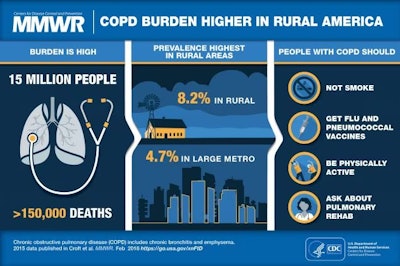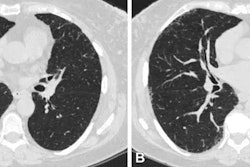
People living in rural areas are likely to have more problems as a result of COPD, according to a document from the Centers for Disease Control and Prevention (CDC).
Citing multiple studies, the CDC said that people who live in rural areas have a higher risk because more of them smoke. Rural residents also have increased exposure to secondhand smoke and less access to programs to help them quit smoking, compared to people living in urban areas.
In addition, the CDC said rural residents are more likely to not have health insurance and have less money. This, in turn, makes it harder for them to get diagnosed and treated early for COPD.
The agency outlined several strategies that medical professionals can take to reduce the risk, including making it easier for individuals to get diagnosed and receive treatment via telehealth programs or establishing clinics in high-need areas. This can help to reduce the number of return trips to the hospital as well as lower the number of deaths from COPD.
Programs and policies to help people who live in rural areas quit smoking can also help improve their lung function. Widespread treatment in rural areas — including pulmonary rehabilitation and oxygen therapy — can be beneficial along with programs that teach people how to better manage their chronic diseases.
The CDC urged health care providers and community partners in rural areas to work together to help adults with COPD get better access to and participate in their health care treatments.























